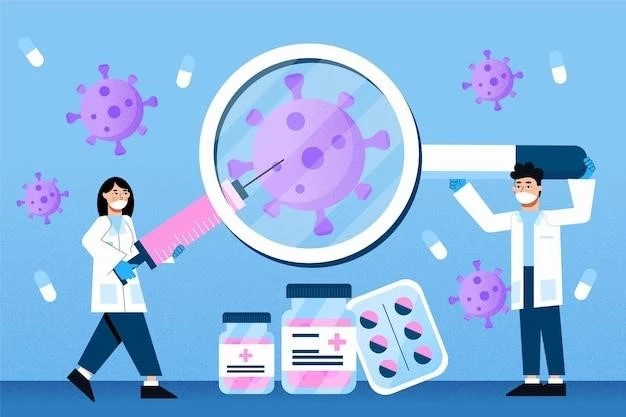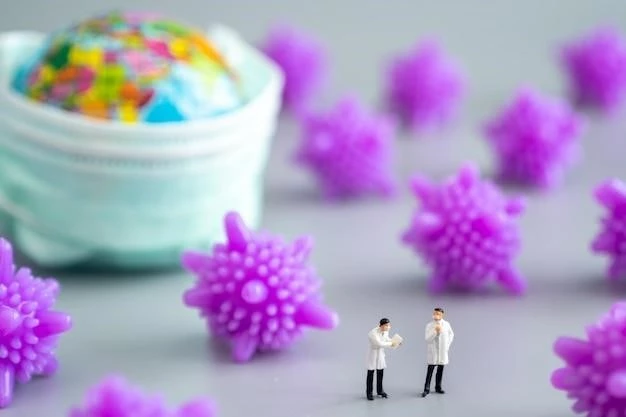Disease ⏤ Human Parvovirus B19 Infection
Human parvovirus B19 infection is a concerning illness that affects individuals of all ages. Understanding its impact‚ symptoms‚ diagnosis‚ transmission‚ and treatment is crucial. Stay informed to protect yourself and others from this virus.
I. Introduction to Human Parvovirus B19 Infection
Human Parvovirus B19 is a contagious virus that can cause a range of symptoms in infected individuals. It commonly leads to a mild illness but can have more severe consequences‚ especially in certain groups. Understanding the nature of this virus and how it spreads is crucial for prevention and management. Stay informed about human parvovirus B19 to protect yourself and those around you.
II. Understanding the Virus
Human Parvovirus B19 is a small‚ single-stranded DNA virus that specifically infects humans. It primarily targets red blood cell precursors in the bone marrow‚ leading to a variety of symptoms. Understanding the characteristics and behavior of this virus is essential to grasp how it affects the body and causes illness. Stay informed about the specifics of human parvovirus B19 to better protect yourself and others.
III. Symptoms of Parvovirus B19 Infection
The symptoms of a human parvovirus B19 infection can vary widely‚ ranging from mild to severe. Common signs include fever‚ rash (especially in children)‚ joint pain‚ and in some cases‚ anemia. Recognizing these symptoms is crucial for seeking timely medical attention and preventing the spread of the virus. Stay vigilant and informed about the possible manifestations of parvovirus B19 infection to safeguard your health and the health of others.
IV. Diagnosis of Parvovirus B19 Infection
Diagnosing a human parvovirus B19 infection typically involves blood tests that check for the presence of specific antibodies or viral DNA. Additionally‚ healthcare providers may consider symptoms like fever‚ rash‚ joint pain‚ and anemia when assessing a potential infection. Seeking prompt medical evaluation and following the healthcare provider’s guidance is crucial for accurate diagnosis and appropriate management. Stay proactive in discussing any concerns about parvovirus B19 with your healthcare provider to ensure timely diagnosis and treatment.
V; Transmission of Parvovirus B19
Human parvovirus B19 is highly contagious and spreads through respiratory secretions‚ such as saliva‚ sputum‚ or nasal mucus‚ as well as through blood. The virus can be transmitted through close contact with an infected person‚ making it essential to practice good hygiene‚ such as regular handwashing‚ and avoid sharing personal items if you suspect exposure. Understanding how parvovirus B19 spreads can help you take necessary precautions to minimize the risk of transmission to others. Stay informed about the transmission routes of this virus to protect yourself and those around you.
VI. Impact on Specific Groups
Human parvovirus B19 can have varying impacts on different groups of individuals. It is particularly concerning for pregnant women‚ as the virus can pose risks to the developing fetus‚ potentially causing severe complications. Additionally‚ individuals with weakened immune systems may experience more severe symptoms and a higher risk of complications from the infection. Understanding how parvovirus B19 affects specific groups can help tailor preventive measures and healthcare interventions. Stay informed about the potential impacts of this virus on specific populations to take appropriate precautions and seek timely medical care if needed.
VII. Effect on Children
Human parvovirus B19 infection can have distinct effects on children‚ often presenting as a mild illness characterized by fever and a rash known as fifth disease. In some cases‚ joint pain and other symptoms may occur. Monitoring children closely for symptoms‚ especially if they are in contact with infected individuals‚ is crucial for early detection and management. Stay vigilant about the impact of parvovirus B19 on children to ensure prompt medical attention and appropriate care if needed.
VIII. Effect on Adults
Human parvovirus B19 infection can affect adults differently than children‚ often causing more pronounced symptoms such as joint pain and arthritis-like conditions. In some cases‚ adults may also experience complications like anemia. It is essential for adults to be aware of the potential impact of parvovirus B19 and seek medical attention if they suspect an infection. Monitoring symptoms closely and following healthcare provider recommendations can help manage the effects of this virus on adults effectively. Stay informed about how parvovirus B19 can affect adults to take proactive measures for your health and well-being;
IX. Development of Complications
While human parvovirus B19 infection typically causes mild symptoms‚ it can lead to complications‚ especially in certain individuals. Complications may include severe anemia‚ arthritis‚ or in the case of pregnant women‚ fetal complications. Recognizing the signs of potential complications and seeking prompt medical attention is crucial for preventing further health issues. Stay vigilant about any worsening symptoms or new developments post-infection and consult with healthcare providers for proper evaluation and management of potential complications.
X. Treatment of Parvovirus B19 Infection
There is no specific antiviral treatment for human parvovirus B19 infection. In most cases‚ the illness is self-limiting and resolves on its own without medical intervention. Symptomatic treatment‚ such as rest‚ staying hydrated‚ and taking over-the-counter medications to reduce fever and joint pain‚ can help alleviate discomfort. However‚ individuals with severe symptoms or underlying health conditions should seek medical advice for appropriate management. It is essential to consult healthcare providers for tailored recommendations on how to manage symptoms and recover effectively from parvovirus B19 infection.
XI. Managing Fever and Rash
When experiencing fever and rash due to human parvovirus B19 infection‚ it is essential to focus on managing symptoms effectively. Stay hydrated‚ rest‚ and consider using over-the-counter medications to reduce fever and discomfort. Additionally‚ cooling baths or compresses can help alleviate skin irritation from the rash. Monitor your temperature regularly and seek medical advice if symptoms worsen or if you have concerns about the progression of the illness. Prioritize self-care practices to help alleviate fever and rash symptoms and promote a smoother recovery from parvovirus B19 infection.
XII. Joint Pain and Anemia
Joint pain and anemia are common symptoms associated with human parvovirus B19 infection. Managing joint pain can involve rest‚ gentle exercise‚ and over-the-counter pain relievers as recommended by healthcare providers. Anemia may require monitoring by medical professionals and‚ in severe cases‚ treatment to address low red blood cell counts. Stay in close communication with your healthcare team to ensure proper management of joint pain and anemia related to parvovirus B19 infection. Prioritize self-care measures and follow medical advice to promote recovery and alleviate the impact of these symptoms.
XIII. Strengthening the Immune System

Enhancing your immune system is vital‚ especially when combating human parvovirus B19 infection. Focus on a balanced diet rich in fruits‚ vegetables‚ whole grains‚ and lean proteins to provide essential nutrients for immune function. Adequate rest‚ regular exercise‚ and stress management can also support immune health. Avoiding tobacco and excessive alcohol consumption is beneficial. Consult with healthcare providers about supplements or additional strategies to strengthen your immune system to better defend against infections like parvovirus B19. Prioritize overall wellness to boost your immune system’s resilience and ability to fight off illnesses effectively.
XIV. Conclusion⁚ Promoting Awareness and Prevention
Enhancing awareness about human parvovirus B19 infection is crucial to prevent its spread and protect vulnerable populations. Stay informed about the symptoms‚ transmission‚ and potential impacts of this virus to recognize and address infections promptly. Practice good hygiene‚ including regular handwashing and avoiding close contact with infected individuals‚ to reduce the risk of transmission. Vaccination may also play a role in prevention in certain populations. By promoting awareness‚ practicing preventive measures‚ and advocating for public health initiatives‚ we can work together to minimize the impact of parvovirus B19 on individuals and communities.
